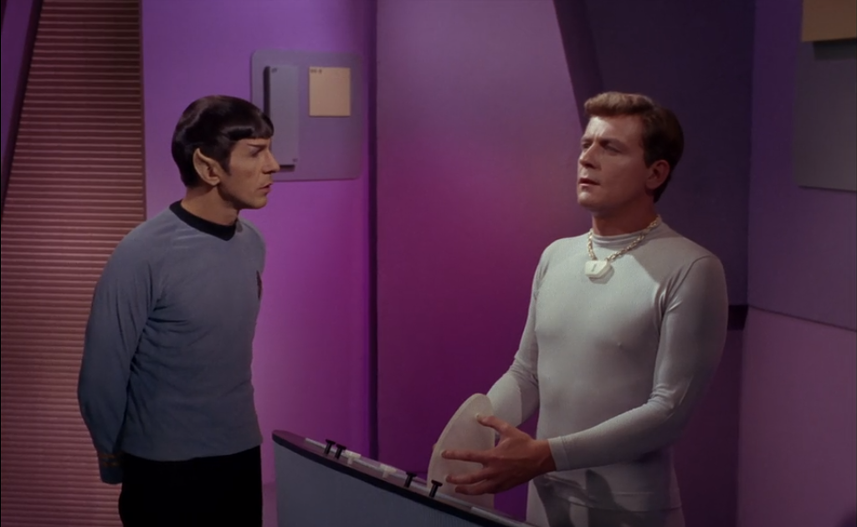For those of us who grew up in the seventies and had an interest in things other than sex, drugs, and rock and roll, Star Trek was a mainstay. The characters, the visuals, the storylines all inspired a generation of scientists, engineers, and explorers. And no other character in Star Trek epitomized a bright new future full of exciting technology more than did Mr. Spock. As a Vulcan, his strong embrace of logic influenced many of us to value reason and clear thinking ever since.
But a curious aspect of Vulcans, in general, and Mr. Spock, in particular, is their illogical devotion to logic. Although the original show frequently emphasized that logic wasn’t enough (often through the intuition or hunches of Kirk, McCoy, or Scott) and that the human experience transcends logic, there is no portrayal that the Vulcans ever examine the basis of logic. As a race, they never seem to engage in meta-logic, the logical look at the underpinnings of logic and an exploration of what it can do well and where it fails.
Clearly this point is not the central concern for the show nor should it be. Nonetheless, it is fun to speculate what Spock might have done should the writers had known about the limits of logic. I’m not speaking of something as sophisticated as the implications of Gödel’s theorem. Rather, I am talking about the simple and obvious issues associated with logic. The need for reasoning to be based on the finite knowledge of beings, the need for first principles or axioms, and the boot-strapping needed to go from a guess to a hypothesis to a theory with strong evidentiary support. In short, inductive reasoning.
Induction is the key pillar of scientific advances; it is the method by which all knowledge of the physical world is explored and gathered. Induction is inherently probabilistic in the way it tries to link cause and effect (think of the number of times Kirk asked Spock for the odds that such-and-such a thing would happen) and has been remarkable successful in helping mankind grope its way to a better understanding of the physical world. But despite its success, its logical foundations are weak.
A nice discussion about the issues associated with inductive reasoning is found in Chapter 5 of Introduction to Logic, by Harry J. Gensler and I’ve cited Gensler and his discussions in several posts in the past.
What struck me about the arguments found towards the end of Chapter 5 is the remarkably fragile way that the whole logical structure holds together when examined closely. In other words, logic examining logic finds itself disappointing in two areas – the proper formulation of induction principles and the justification for believing an inductive argument.
The element of probability inherent in induction can lead to some absurd and laughable conclusions. Gensler offers this statistical syllogism by way of illustration.
This non-Democrat is a Cleveland voter
This is all we know about the matter
Therefore, it’s 60 percent probable that this non-Democrat is a Democrat
Of course, this is a nonsense argument; but before being quick to dismiss it consider these three areas where arguments like this are not easy to spot and can do damage. First is the student (at any age) who is learning a subject for the first time. Unless the entire curriculum is memorization, somewhere along the line the student will need to infer something based on the knowledge in hand. This step is usually where beginners make their mistakes – jumping to an unwarranted conclusion precisely because their induction skills (their intuition) haven’t been honed within the broader context. This leads to frustration and, far to often, abandonment of the subject. Extending this idea to machine-based inference engines, ones whose intuition can’t be improved through learning (at least not in the way humans learn), brings to the forefront the fact that the need for rigorous laws of inductive inference is far more acute. Even though it makes for engaging science fiction, we don’t want a machine in our lives coming up with an absurd conclusion just because of sloppy rules. And finally, large components of society are constantly being grifted by arguments of the Cleveland-voter sort. We see it in politics, advertising, and all the other sophistical interactions surrounding us. To quote P.T. Barnum, “There’s a sucker born every minute.” Unfortunately, as Gensler goes to great pains to point out, there doesn’t seem to be a way to make the rules of inductive inference tighter. Even principles, like Occam’s Razor, are merely guidelines that must be applied with judgement. Or, as I like to phrase it, there doesn’t seem to be a way to make inductive logic ‘sucker-proof’.
Even more interesting is the fact that justification of inductive arguments seems to be self-referential and circular. Gensler discusses the criticism leveled by David Hume against induction and the five responses that have arrived over the intervening years. I won’t go over all five in detail but will confine the discussion to the three most interesting ones.
- Justification for induction can be done by presuming nature is uniform, meaning that it works in regular patterns. I happen to favor this justification even though Gensler is correct in insisting that it is hopelessly vague. Curiously, his most interesting observation is that the idea that nature is uniform is based on arguing from prior experience. This argument is inductive and thus we have induction justifying induction.
- Closely related is the idea that inductive methods have been so profoundly successfully in every aspect of life that they must be correct. Of course, this is another circular argument in which an inductive syllogism is used to justify the inductive method.
- The final response Gensler cites is the most interesting – that we approach the justification of inductive logic in the same way we approach the justification for deductive logic. He singles out modus ponens as that particular part of deductive logic worth examining. Why does modus ponens work and why should we believe it? This last question is most germane when considering the truth table for modus ponens where the premise is false but the consequent is true ($A \rightarrow B$ is true if $A$ is false but $B$ is true). In some sense this is an arbitrary convention (although a reasonable one – if I can use a very vague word). So why should we expect modus ponens to work? How do we justify it? He first says that we might try using this syllogism
If the truth table for modus ponens never gives true premises and a false conclusion, then modus ponens is valid.
The truth table for modus ponens never gives true premises and a false conclusions.
Therefore, modus ponens is valid.But here we have a problem, we are using modus ponens to justify modus ponens. The justification, even in the firm ground of deductive logic, leaves something to be desired.
In the end, it seems that we have to simply accept that logic has its limits and that, as a race, we’ve bootstrapped our way to our present level of knowledge. This holds for inductive and deductive logic, with the former providing the basis for the latter (i.e., experience has taught us that deductive logic axioms are the ones we need to assume to get the whole thing to work). Gensler concludes with:
Inductive reasoning has been very useful. Instructively, we assume that it will continue to be useful. In our lives, we can’t do without it. But the intellectual basis for inductive reasoning is shaky.
It would have been interesting to hear Mr. Spock discuss these points, to argue these a bit with the more intuitive Kirk. But perhaps a serious examination would have undermined the entire purpose that he served on the show. Perhaps it would have undermined the very reason for Vulcan to be, and maybe that would have been an episode worth seeing.

